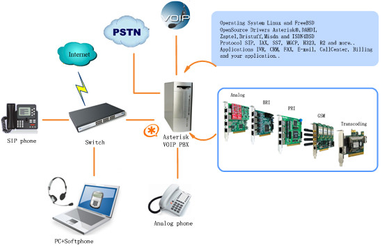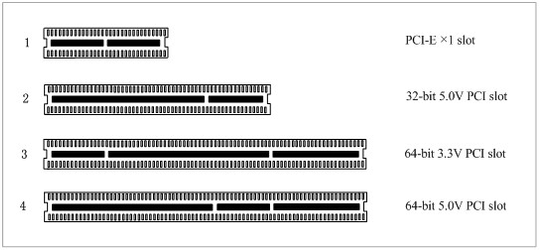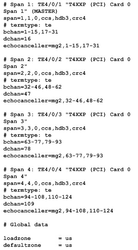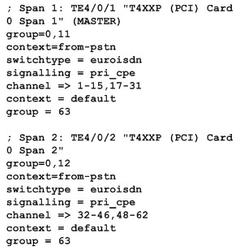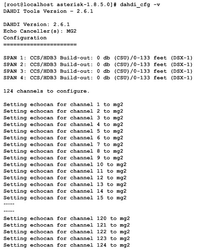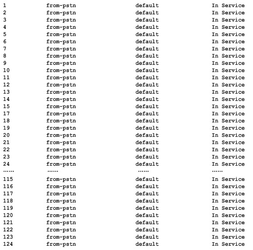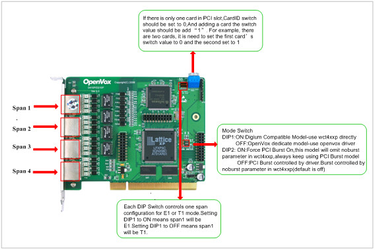...
Asterisk is a complete PBX in software. It runs on Linux, BSD, Windows (emulated) and provides all of the features you would expect from a PBX and more. Asterisk does voice over IP in four protocols, and can interoperate with almost all standard-based telephony equipment using relatively cost-effective hardware. Asterisk provides Voicemail services with Directory, Call Conferencing, Interactive Voice Response, Call Queuing. It supports for three-way calling, caller ID services, ADSI, IAX, SIP, H323 (as both client and gateway), MGCP (call manager only) and SCCP/Skinny (voip-info.org).
...
Figure 1 Topology
1.2 What is D410P/DE410P
The DE410P is a D410P with an EC module, and they support E1, T1 and J1 environments. It is selectable on a per-card or per-port basis. This feature enables signaling translation between E1 and T1 equipments and allows inexpensive T1 channel banks to connect with E1 circuits.
...
D410P/DE410P is compatible with 32-bit 5.0V PCI slot, 64-bit 3.3V PCI slot or 64-bit 5.0V PCI slot except PCI-E slot; you should confirm your slot type and insert D410P/DE410P into any type of PCI slot as previously described.
Figure 2 PCI-E and PCI slot
2.4 Timing cable
If you have just one card in the system, all channels on that card have already run under the same clock source, so timing cable is unnecessary. But if there are more than one card, using timing cable has some advantages. Before using the clock line, each card works on its own clock, therefore precision of the clock is limited; each card will send /receive voice data at different speeds. In voice usage, this small issue can be omitted, but in data communication such as Fax/Modem, it will cause big problems. Data loss will cause communication broken or fax broken. Timing cable will force all cards to work at the same clock source, send data at the same speed, as a result no data will lost.
...
Check the outcome and confirm your system has recognized D410P/DE410P. If it has been recognized, "communication controller" will be displayed in the output information like that:
Figure 3 Hardware detection
If D410P/DE410P is not recognized by the system, you have to power off and take out the card, then try to insert it into other PCI slot.
...
A part of system.conf which is one of the basic channel configuration files is displayed.
Figure 4 A part of system.conf
2. Country mode modification
...
A part of file /etc/asterisk/dahdi-channels.conf is showed as below. (Modification, if it is not agree with the hardware setup)
Figure 5 A part of dahdi-channels.conf
After modifying the country mode, please execute the following command:
...
The command is used for reading and loading parameters in the configuration file system.conf and writing to the hardware. A part of outputs are showed in the following figure.
Figure 6 Channel map
3. Asterisk initiation
# asterisk –vvvvvvvgc
...
localhost*CLI> dahdi show channels
Figure 7 channels show
If DAHDI channels are found, it means they have been loaded into Asterisk. You are going to edit dialplan by your requirements.
...
# vim /etc/asterisk/extensions.conf
Figure 8 dial plan
Additional function
Users should run command "cat /proc/interrupts" to check D410P/DE410P has independent interrupt. If it shares interrupt with other device, it may cause some problems even cannot work normally. Or you can see if the EC module is working as follows:
Figure 9 EC module show
...
Appendix B Jumper and Switch Settings
